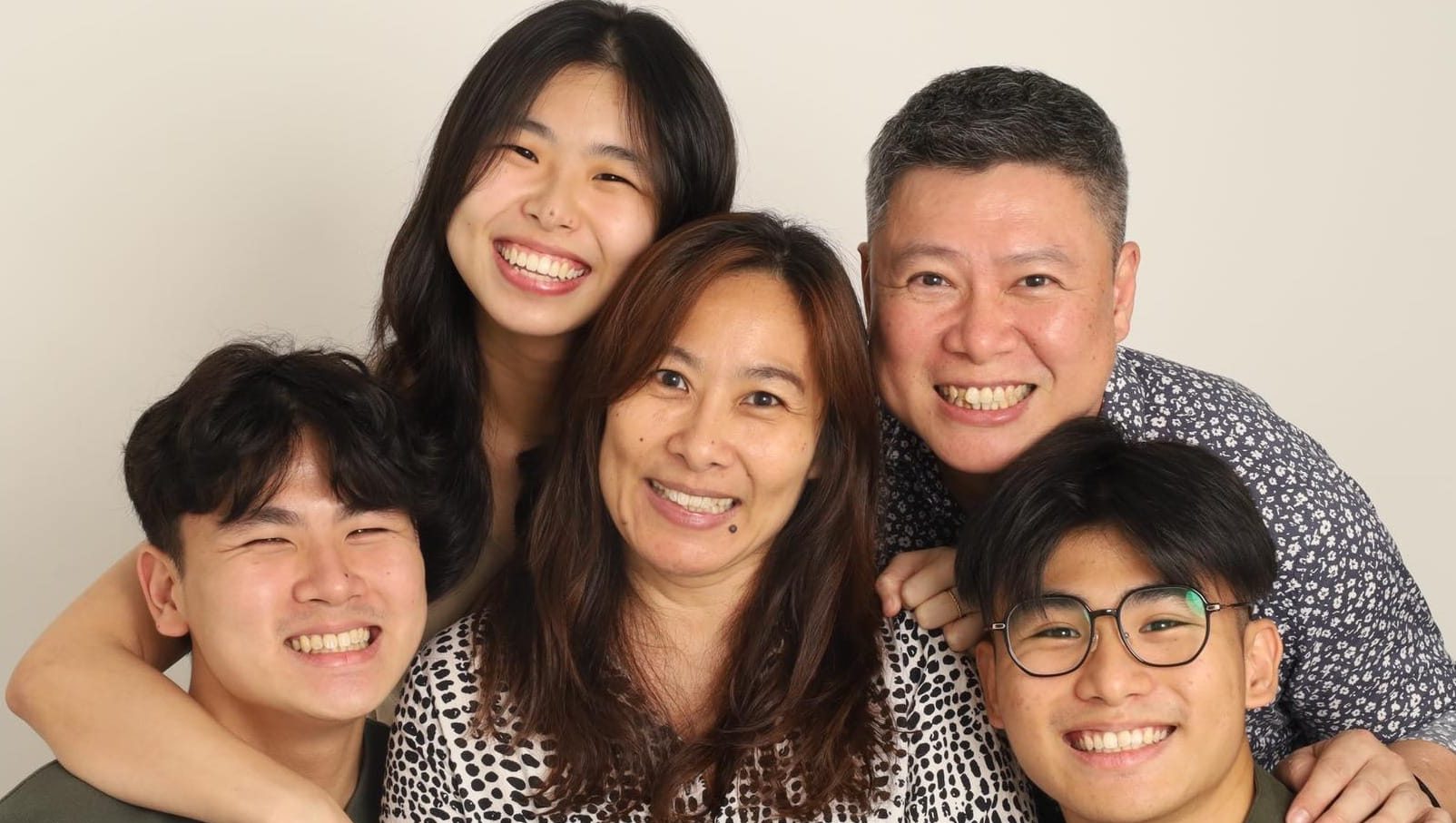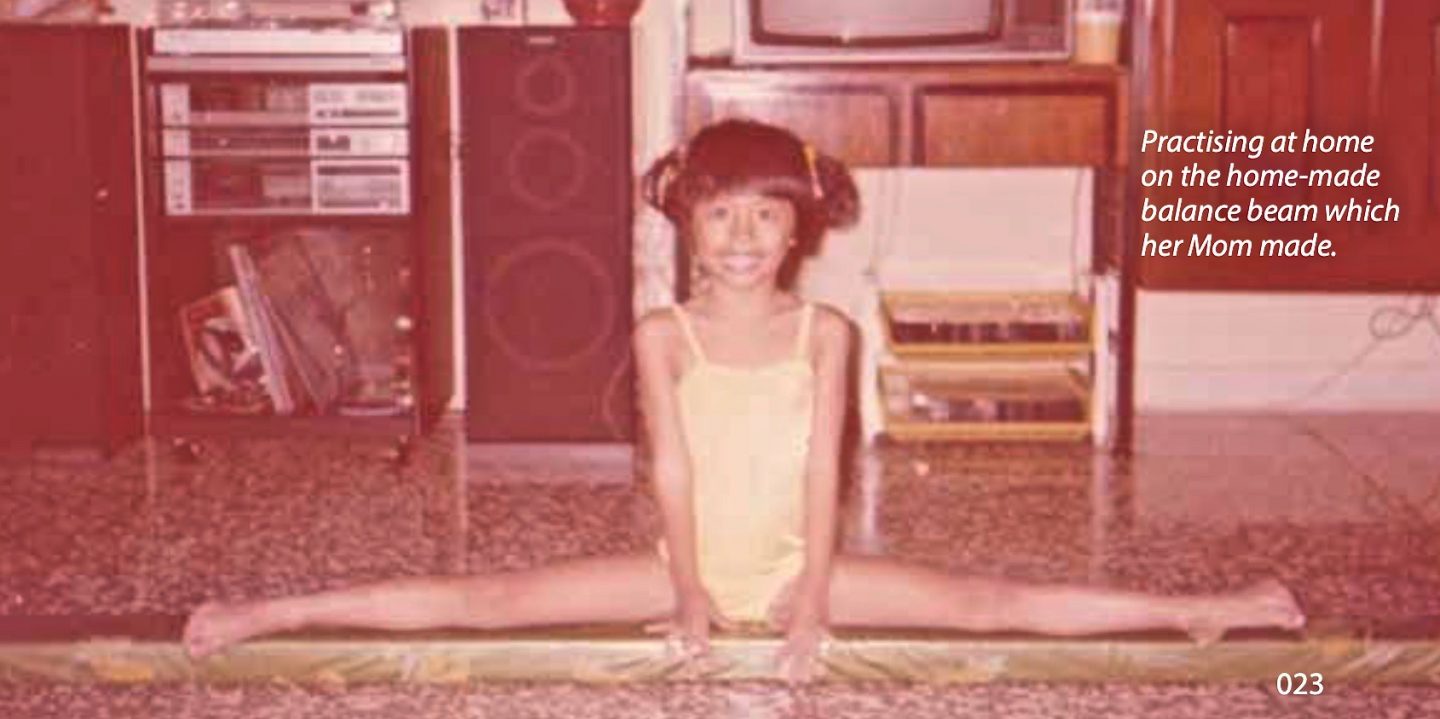
When Eileen was just four, she was so inspired by legendary gymnast Nadia Comaneci that Eileen's mother set up a "balance beam" for her to practise gymnastics at home. All photos courtesy of Eileen Chai.
Eileen Chai was a prodigy – in sports and anything else that she put her mind to.
At seven years old, she became the youngest artistic gymnast who qualified for the 1985 Southeast Asian (SEA) Games.
At 10, she won her first international gold medal at the ASEAN Schools Gymnastics Championships.
The achievements and accolades came to her one by one, fast and furious.
At 13, she achieved bronze for gymnastics at the SEA Games.
At 15, she broke the National Age Group Record for 100m Hurdles.
At 16, she won gold at the Asia Pacific Diving Competition and was named the “Best Diver of the Year” by the Singapore Amateur Swimming Association.
At 21, she picked up violin and began playing the violin and viola for the National University of Singapore Symphony Orchestra and later the Singapore Youth Orchestra.
At 27, she broke the National 100m Hurdles record.
The achievements and accolades came to her one by one, fast and furious.
I have a dream
How did she accumulate so many distinctions in diverse fields so fast, so soon?
It all started with a dream … a dream which she later found had cost her more than she could imagine.
“I wanted to win a gold in the SEA games and maybe take part in the Olympics. I wanted to be like Nadia Comaneci.”
When Eileen was four years old, her mother showed her videos of Nadia Comaneci on the TV.
In 1976 in Montreal, the Romanian gymnast became the first gymnast in Olympic history to be awarded the perfect score of 10.0 for her performance on the uneven bars. She went on to become the youngest all-around Olympic gold medallist ever.
Young Eileen saw Nadia flying in the air on TV and she was hooked.
Noticing her daughter’s fascination with the sport, Eileen’s mother brought a wooden beam home from a construction site nearby and wrapped it in plastic. That piece of wood became the balance beam that Eileen would start practising her back somersaults on at home as she began to take classes in the sport.
She was having a lot of fun with the sport; it was not about winning competitions then, though she represented Singapore in the sport when she was just seven years old.
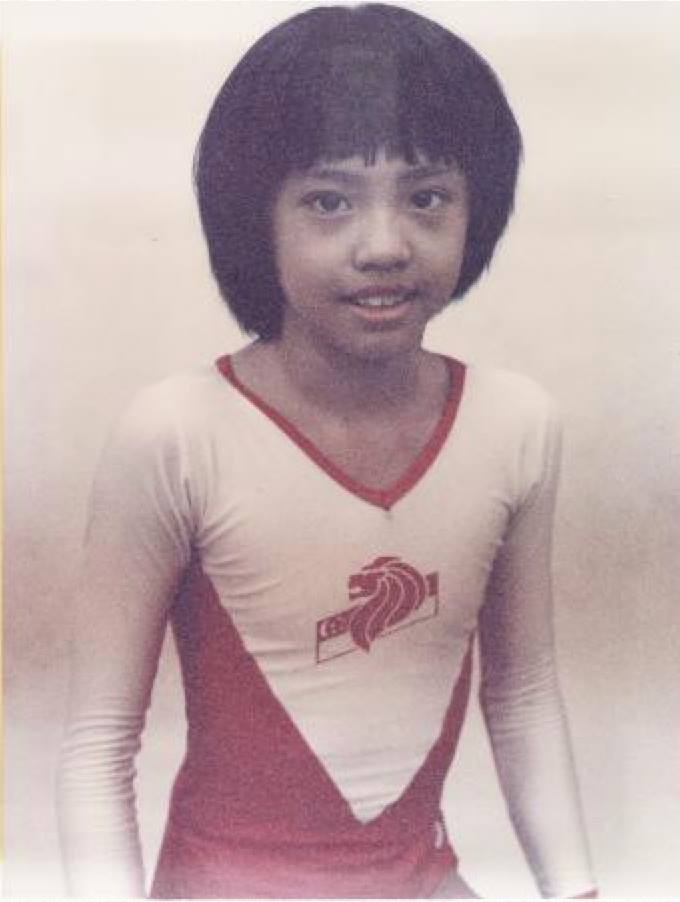
Young Eileen training in China.
Later on, it dawned upon her that she would not be able to reach the performance standards of gymnasts produced by the powerhouses of Russia, China and the United States if she stayed in Singapore to train, as the local coaches did not have the relevant expertise.
“I saw the coaches pulling the hair of the children and pushing them to the floor when they did not perform well.”
She asked her parents if they could send her abroad to train. Fortunately, her father had business contacts in China and was able to make arrangements for her to join a sports hub training school there.
“I wanted to be a better gymnast, to win a gold in the SEA games and maybe take part in the Olympics. I wanted to be like Nadia,” said Eileen.
So when she was nine years old, Eileen packed her bags and travelled alone to the training school in Guangzhou. During the school holidays in Singapore in March, June and December, she would live in its onsite hostel and receive intensive training with all the other gymnasts and athletes in the sports hub.
Her training schedule was rigorous.
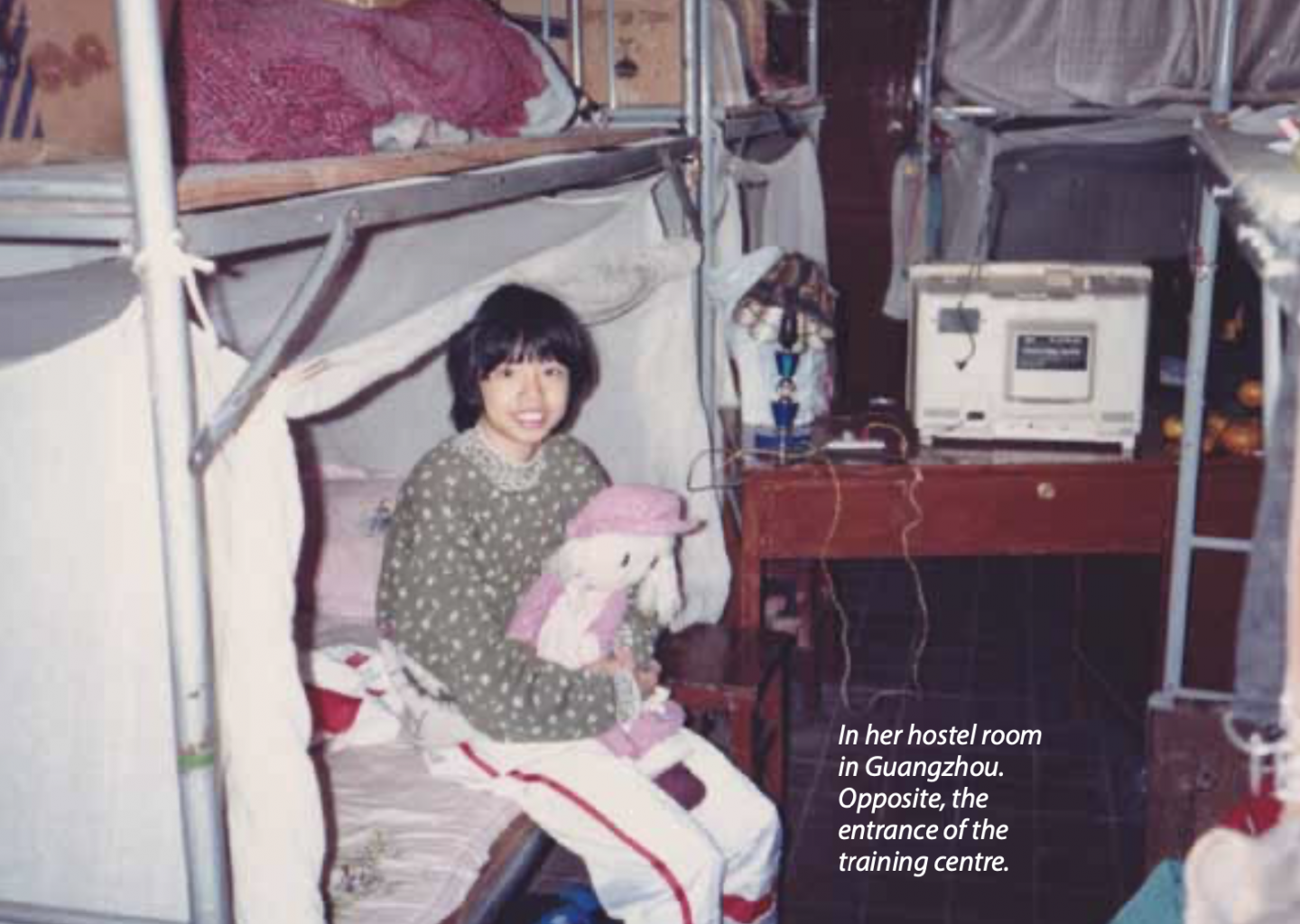
Eileen in her hostel room, which was directly beneath the stadium where the athletes trained.
By 6am every morning, the children should be ready to cycle to the track to run their rounds. No one would talk to each other as all of them were afraid of how many rounds they would have to run that morning. If any of them was not sprinting fast enough in the cold, the coach may order the person to run another lap.
After that, they would cycle to the gym to do conditioning exercises. A typical session would include 10 back somersaults or 10 sets of 1-minute handstands continuously, and if the person did not land properly, he or she would have to repeat the set of 10 from the start.
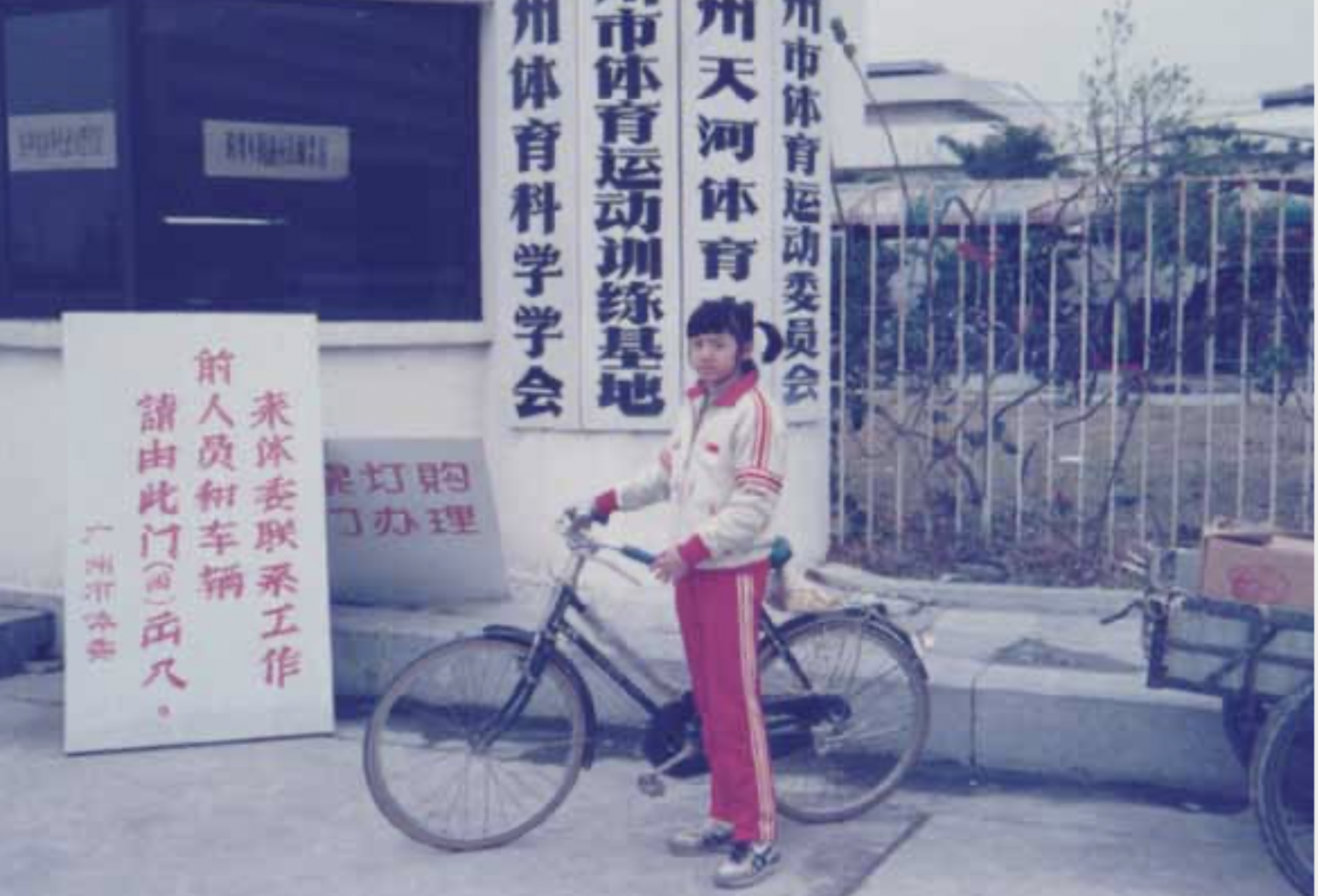
Eileen, like other athletes, would cycle from one training ground to another to get around the sports hub.
The children lived in fear, as they did not know when they could be picked on. By the time the gymnasts cycled to the canteen for breakfast, they would typically be among the last of the athletes to arrive and all the food that was left would not only be cold, but were slim pickings.
After breakfast, they would begin their morning training at 9am till noon, before going for lunch and a short nap, and then proceed to the afternoon training from 2.30pm to 6pm.
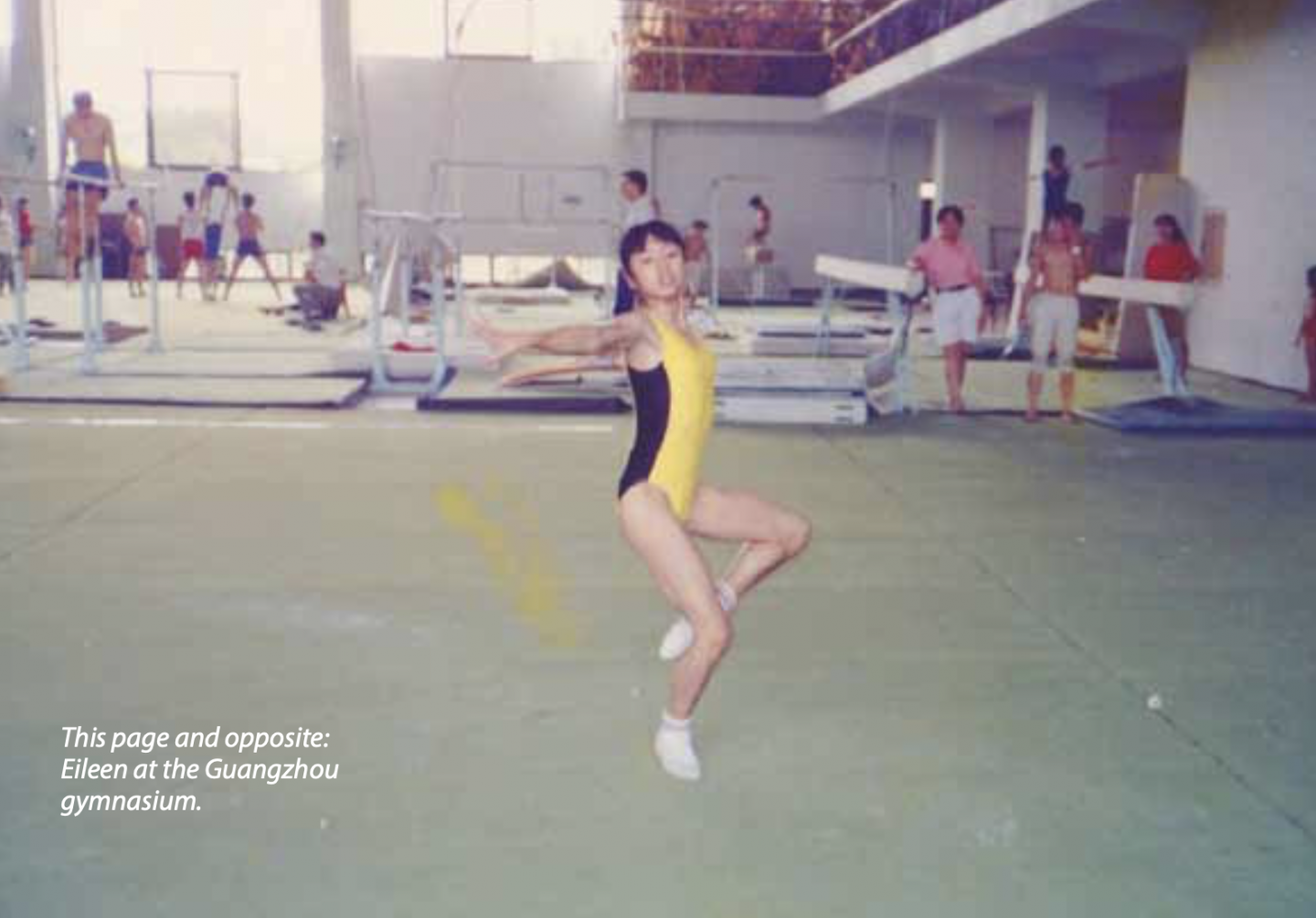
Eileen at the gymnasium in Guangzhou.
“I was not physically abused as I was treated (better) as a foreigner, but a lot of fear was imbued in me when I saw the coaches pulling the hair of other children and pushing them to the floor when they did not perform well enough,” said Eileen.
“I would imagine how they were feeling, or wonder if it would happen to me next.”
It did not help that Eileen had no adult to process these emotions with. Then, making a call overseas was very expensive and she could only write letters to her mother and her penpal in Singapore.
The letters took weeks to arrive, and she did not want to burden her mother with her anxieties. Her father was mostly based in Hong Kong for work.
Eileen knew she was fortunate to have the opportunity and resources to pursue training overseas. Her family was very supportive; when she was in Singapore, her mum would ferry her to and from training venues.
Motivation through fear
“The methods the coaches used to motivate us to do better, through scolding and punishment, were not ideal. But they were the only methods that they knew because they themselves grew up with those methods and they seemed to work,” said Eileen, now 42.
She became a very lonely child. A week could go by without her speaking a single word to anyone.
“But there were no adults to explain all these to me and it became quite overwhelming when I witnessed all this (disciplining) being done to others every day,” she added.
Eileen internalised such expectations, from herself and others, and whenever she felt she had failed in some way during training, she would blame herself for being useless and bang her head against the wall to punish herself.
She became a very lonely child. A week could go by without her speaking a single word to anyone. At her trainings, all she needed to do was to follow instructions and nod her head to indicate assent.
There was not much time to socialise with others as, after dinner, the children would head back to their hostel to wash their own clothes or do their homework. There was no heater, even during the winter, so immersing her hands, which was full of blisters from her training, in cold water to wash the clothes was always a painful experience.
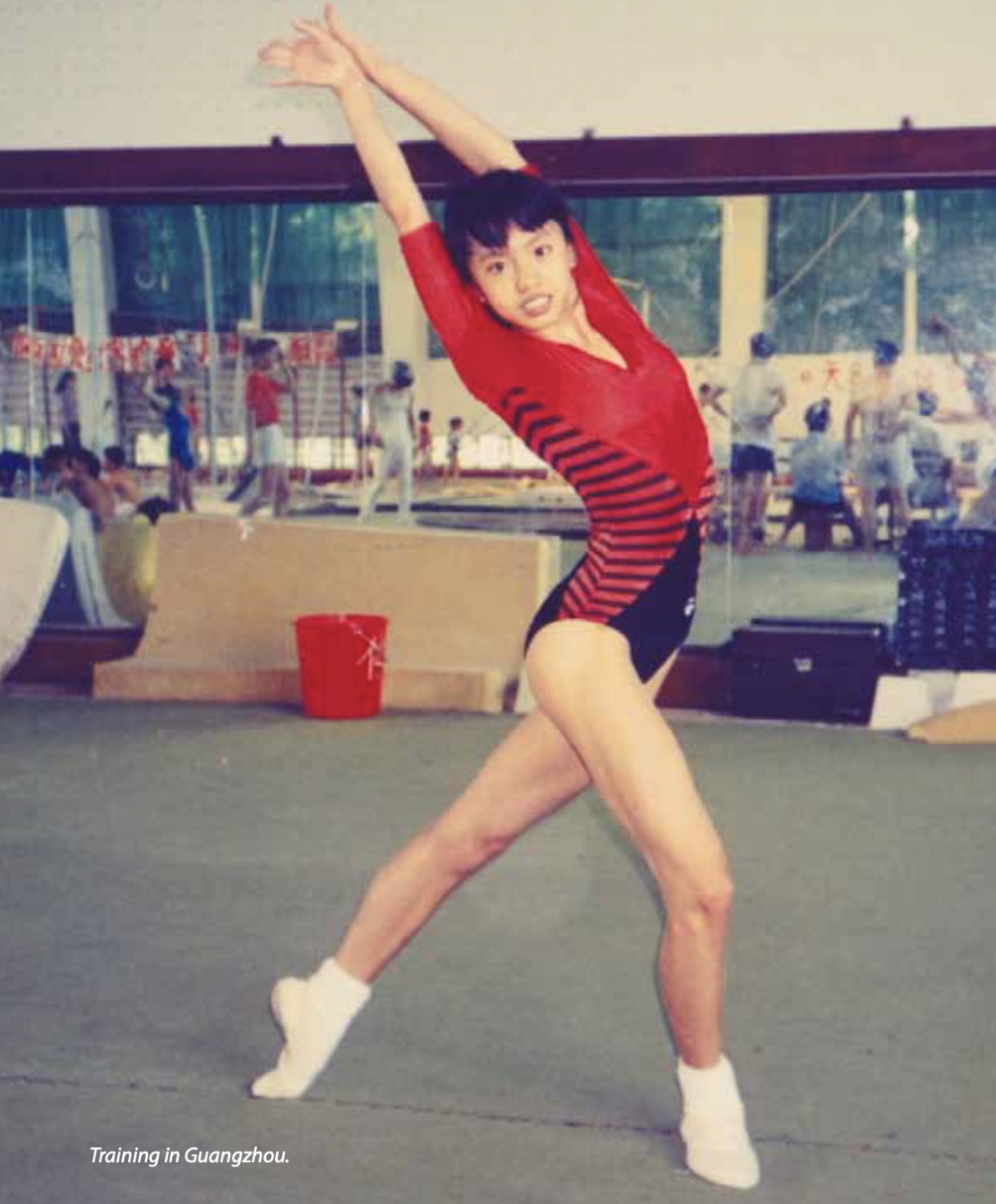
12-year-old Eileen training in Guangzhou.
Every night before she slept, however, Eileen would make it a point to read the Bible that was by her bed.
It was the only book that she had brought with her to China, given to her by fellow gymnast, David Yeo, who was then a junior college student.
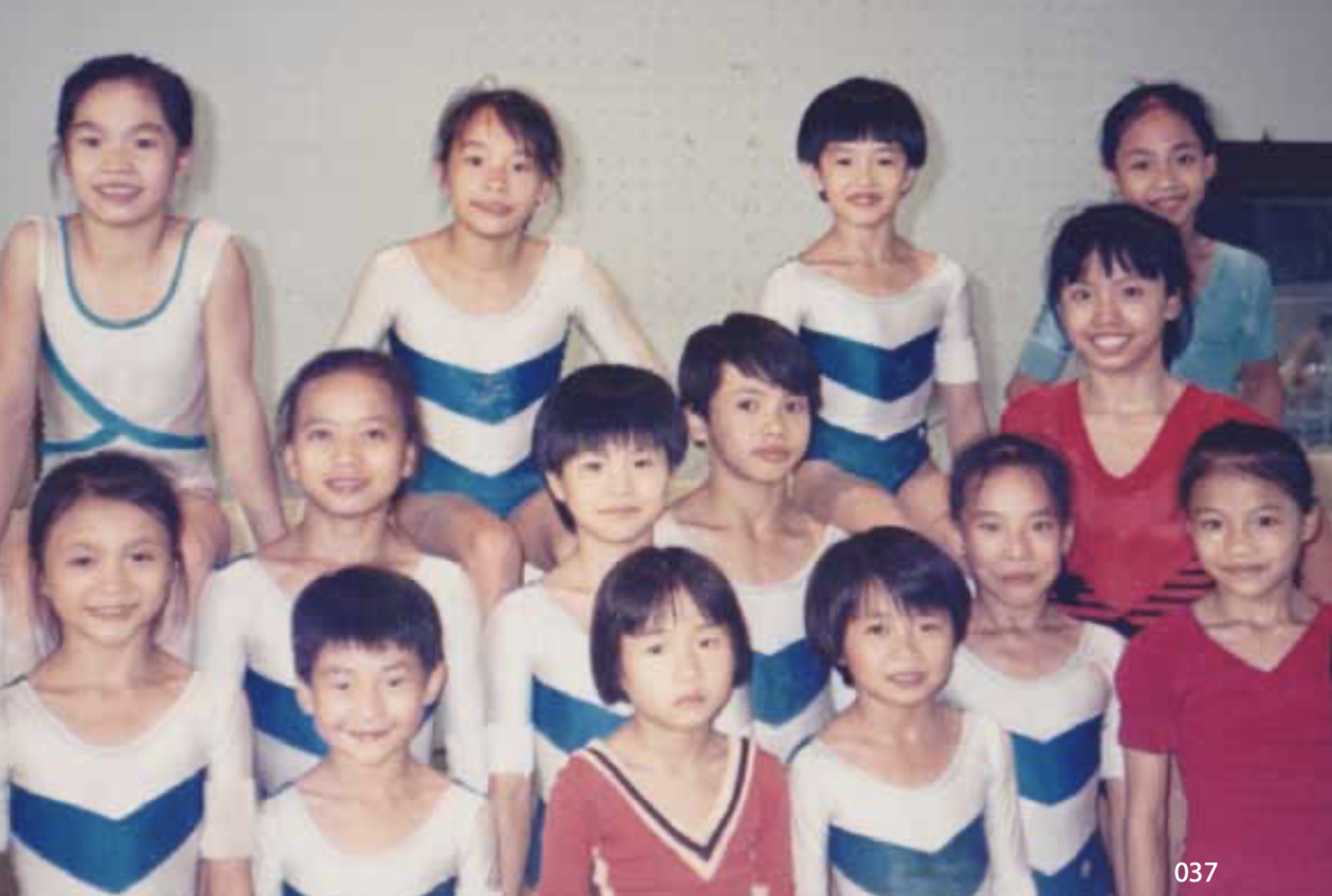
Eileen (in red, middle row, on the right) and her teammates in China.
When their teams travelled overseas for competitions, he had noticed that she was usually on her own. She would wake up early and do exercises by herself along the corridors in the hotel.
“Someday we’ll find it, the rainbow connection,” she sang, hoping someone would hear her cry and talk to her.
She had never known how to socialise with others as she was fixated on her training.
When she was back in Singapore, her schedule was as punishing as that in China: A morning training session before school started, then classes, followed by lunch in the car while being driven to her afternoon training session, and then dinner in the car before a night training session and then finishing her homework before bedtime.
Her classmates did not see her often in class, as she participated in many competitions.
Unlike others, she did not have the luxury of hanging out with her classmates and going to birthday parties.
Her first Bible
Seeing that she was a rather lonesome child, David beckoned her over one day and handed her a Bible. “You can read this and talk to God,” he told her.
Every night in her darkened hostel room in China in the late 1980s, Eileen would read a few pages of the Bible.
It was a used Bible with some verses highlighted but Eileen was drawn to it because it carried a floral scent and it was one of the rare gifts that she had received from others.
Every night in her darkened hostel room in China in the late 1980s, Eileen would read a few pages of the Bible.
It was difficult to read, full of “thy” and “thou”, but she kept at it because it distracted her from the fears and pain she was experiencing during the training there. She also began to talk to God.
“He was like a friend I could talk to and I would ask him to keep the mosquitos out of my room, to help me have less blisters so that it will be less painful when I shower or do the laundry, and to help me to do my gymnastics moves properly,” said Eileen.
Then she would hug her Bible to sleep, while singing and crying to the lyrics of “Rainbow Connection”, a song she had heard sung by Kermit the Frog from the children’s characters, the Muppets.
“Someday we’ll find it, the rainbow connection,” she sang into the still air of the night, hoping someone will hear her cry and talk to her.
Breaking point
After going through three years of intense training both in Singapore and China, Eileen’s body was showing signs of strain. She was suffering from so many injuries that her physiotherapist would circle the outline of the whole human body on her paper instead of circling a particular part of the body that was damaged and needed treatment.
She realised she was so tired from her years of training since young, that she was close to a breakdown.
Eileen would bandage her wrist, ankles and shin tightly to numb the pain so that they would not give way during training. She continued to berate herself for being useless.
By this time, her motivation to excel in the sport no longer stemmed from passion. It was because she and her parents had invested so much energy, time and money in the sport that she felt that she needed to deliver results for her parents and for Singapore.
One month before the 13-year-old was due to compete in the SEA Games, she fractured her elbow.
Physically and mentally, she was drained, but she had no choice but to bite the bullet and give it her best shot at the Games. Despite her injury, she won a bronze for Singapore.
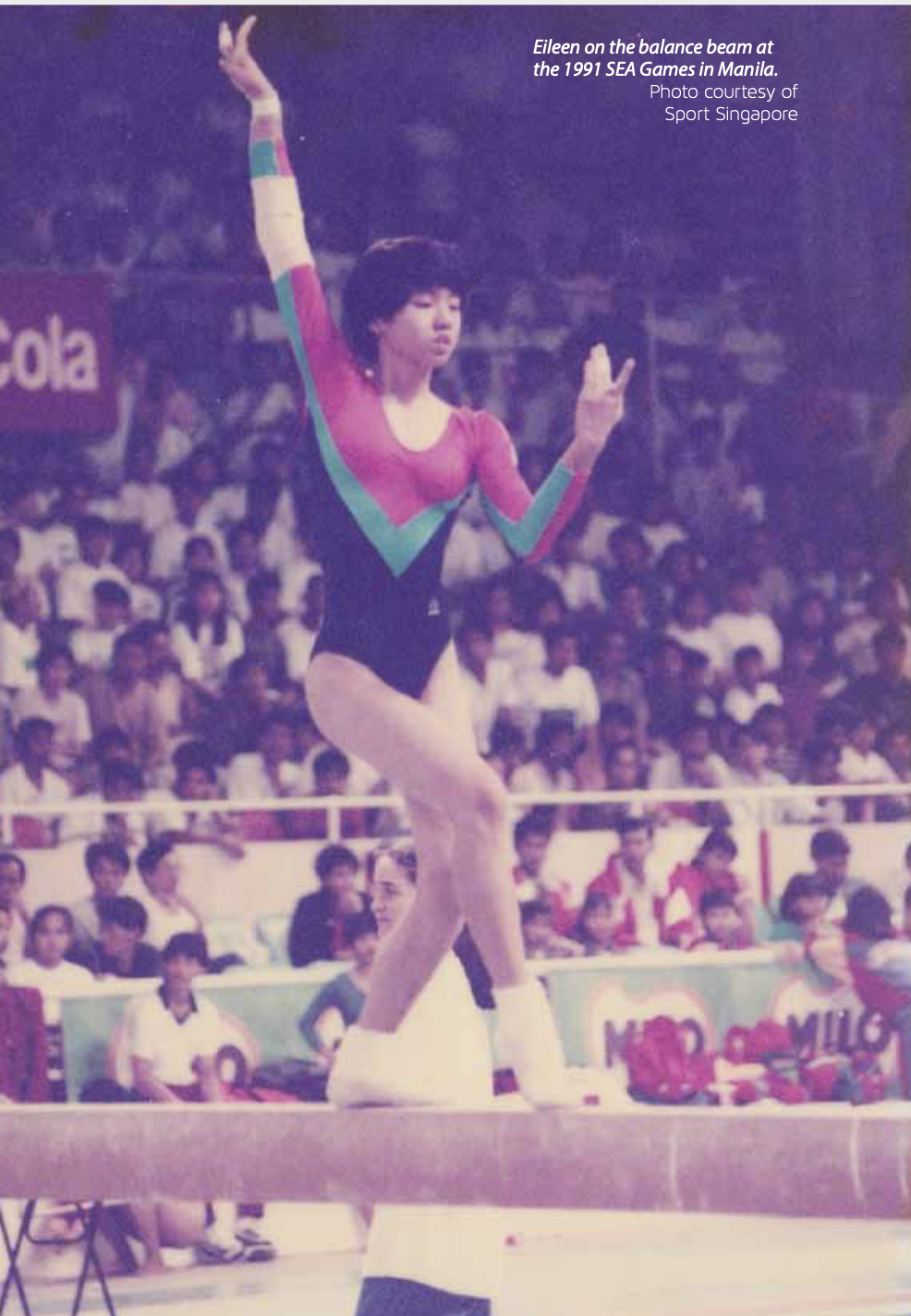
Eileen on the balance beam at the 1991 SEA Games held in Manila.
The Australian Institute of Sports talent-spotted her at the Games and invited her to Australia to train and become a citizen there.
“The Australia team was strong and I realised this was a rare chance to fulfil my Olympic dreams,” said Eileen, who went to Australia for a few days to check out the training facilities.
When she returned to Singapore, however, reality sank in.
She realised she was so tired from her years of training since young, that she was close to a breakdown.
She was experiencing a lot of pain from her injuries and felt she had no more energy to move or think properly any more.
With her body in such a state, she called it a day with gymnastics.
Hurdling and diving
When Eileen was in Secondary 2, her teacher asked her to join the school’s Track and Field team. She did so and broke the National Age Group Record for 100m hurdles one year later.
Yet her body and mind continued to spiral downwards. She would get a mental block during competitions and not be able to move because her legs felt so heavy.
A coach from the Singapore National Olympic Council approached her to ask if she would like to change sports and try springboard diving instead, as the council was trying to revive the sport.
Being a high achiever, she desired to accomplish her goals at any cost. But it led to her dislocating her shoulder and breaking her toe during diving training.
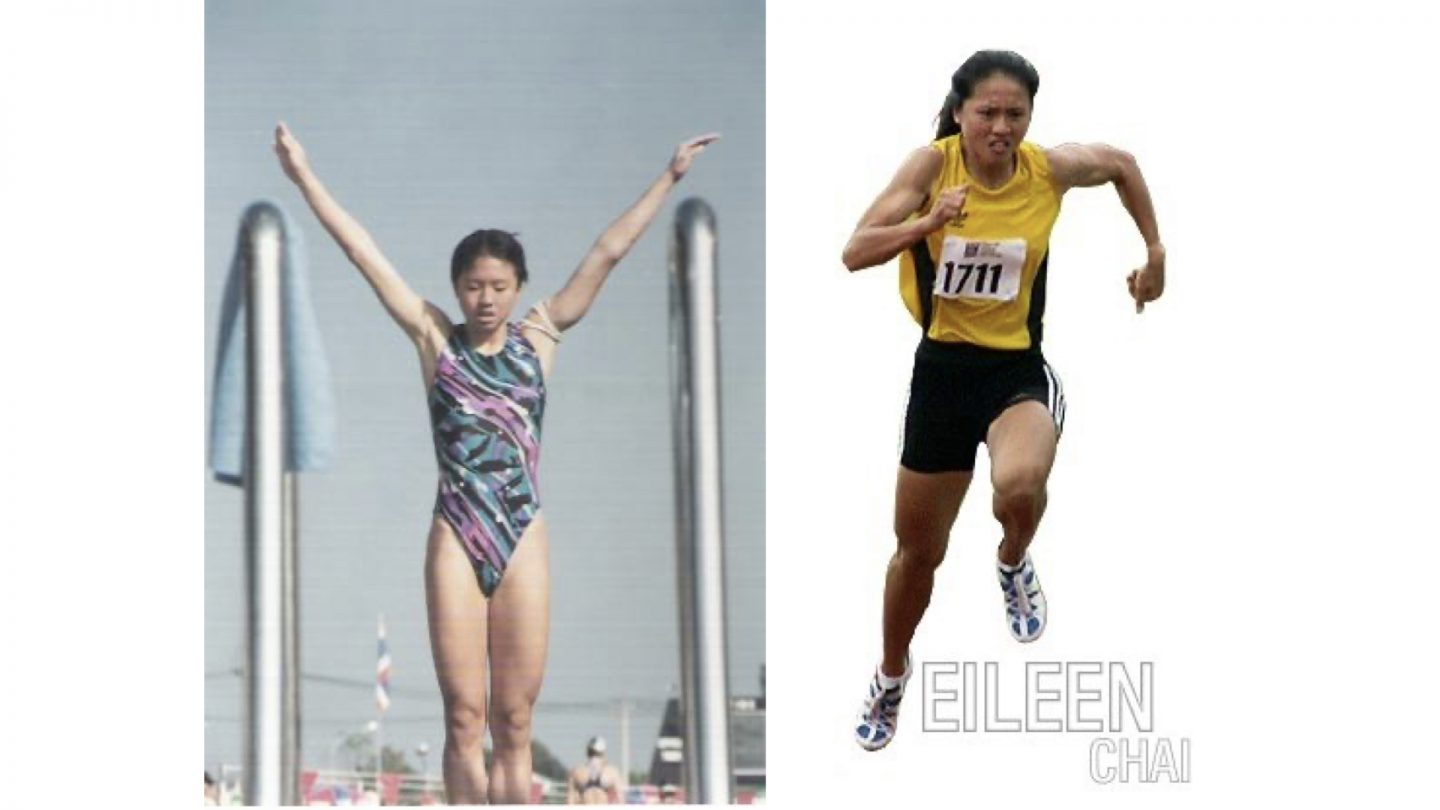
Eileen on the diving board and in track and field.
After her ‘O’ level exams, once again she felt she needed to turn to China for training if she wanted to up her game in diving.
She delayed going to junior college for a year and instead headed back to Guangzhou, training under a top diving coach in China. At the age of 16, she won gold at the Asia Pacific Diving Competition.
Yet her body could not withstand the stress it was being put under.
Her left shoulder gave way one month before she was due to compete at the SEA Games in Thailand for diving. She decided to push on and continue participating in the Games, despite having to have a change in the coach assigned to her, as her coach was unable to leave China.
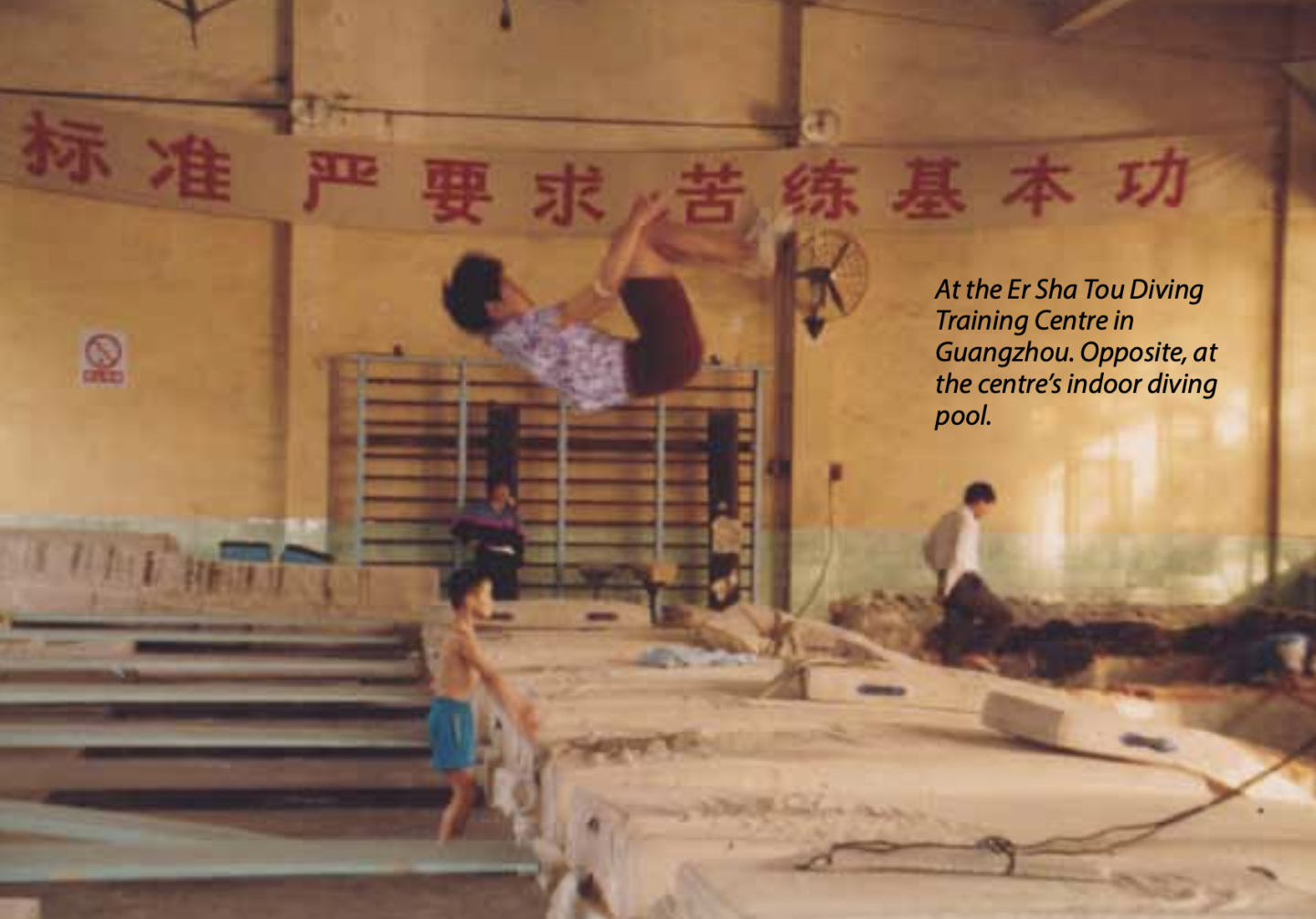
16-year-old Eileen at the diving training centre in Guangzhou.
In Thailand, Eileen said her newly assigned coach was often not around and she even had to ask a fellow competitor to help her bandage her shoulder before she competed. Overworked and in pain, she came in last.
Her eyes lit up upon spotting her favourite instrument, the violin, which she had played a little when she was young.
“Tired and discouraged in Thailand when a journalist interviewed me, I just cried and let all my worries out about feeling lonely. Unfortunately, the article portrayed me as having poor sportsmanship,” said Eileen.
That was the last straw for Eileen. She was hurt by the media reports and did not know how to face people. She decided to give up sports for good.
But in junior college, life without training felt aimless to Eileen.
She tried to make up for lost time by desperately trying to make friends – to the extent that she failed her 2.4km fitness run in order to accompany a less fit friend to the finishing line.
It was in her college days that she began to display symptoms that show that something more sinister than mere social awkwardness was developing.
Anxiety and loneliness
Though she was elected vice-captain of her house in college, she never showed up for their meetings.
Even the prospect of taking a photo with a group of her ex-boyfriend’s friends led to panic.
People thought she was irresponsible, but the actual reason was that she was too afraid of not knowing what to say or how to lead in those meetings.
Even the prospect of taking a photo with a group of her ex-boyfriend’s friends led to panic, and she hid in the toilet to avoid the camera.
At the National University of Singapore, she was elected vice-president of the Microbiology Students’ Society, but again she kept avoiding her committee members outside of lectures. She was anxious about meeting people. And yet she also felt lonely.
Her ex-boyfriend encouraged her to join NUS Campus Crusade for Christ, and this was where she managed to make some friends as well as learn more about God and the Bible, picking up from where she left of from those early days of reading the Bible before she slept in China.
One day, she walked past a rehearsal room and saw members of the NUS Symphony Orchestra laughing and having a ball of a time. Her eyes lit up upon spotting her favourite instrument, the violin, which she had played a little when she was young. She decided to join the orchestra and pick up violin again and hopefully make more friends.
She put her mind to learning the violin and passed her Grade 8 exams within a year. Upon graduation, she also joined the Singapore Youth Orchestra where she played the viola and spent a year studying at the Chicago College of Performing Arts before returning to Singapore.

Eileen picked up the violin at the National University of Singapore. Photo by Femke Tewari.
By then, she was also married but was in an abusive relationship.
Since young, she had blamed herself for anything that went wrong, so she endured the violence in her marriage. One day, her ex-husband hit her so hard in the car that she was bleeding when he dropped her off along the road. A stranger, an Indian woman, asked if she was all right and proceeded to call the police even though her husband objected.
At that time, she was studying to be a PE and music teacher and coach. A Malaysian coach noticed that Eileen still had what it took to compete in track and field and persuaded her to be coached by him in Malaysia.
Oftentimes when she went for his training, she would turn up with purple lips. He noticed her injuries and urged her to tell her family about the domestic violence and file for a divorce. He also encouraged her to pray.
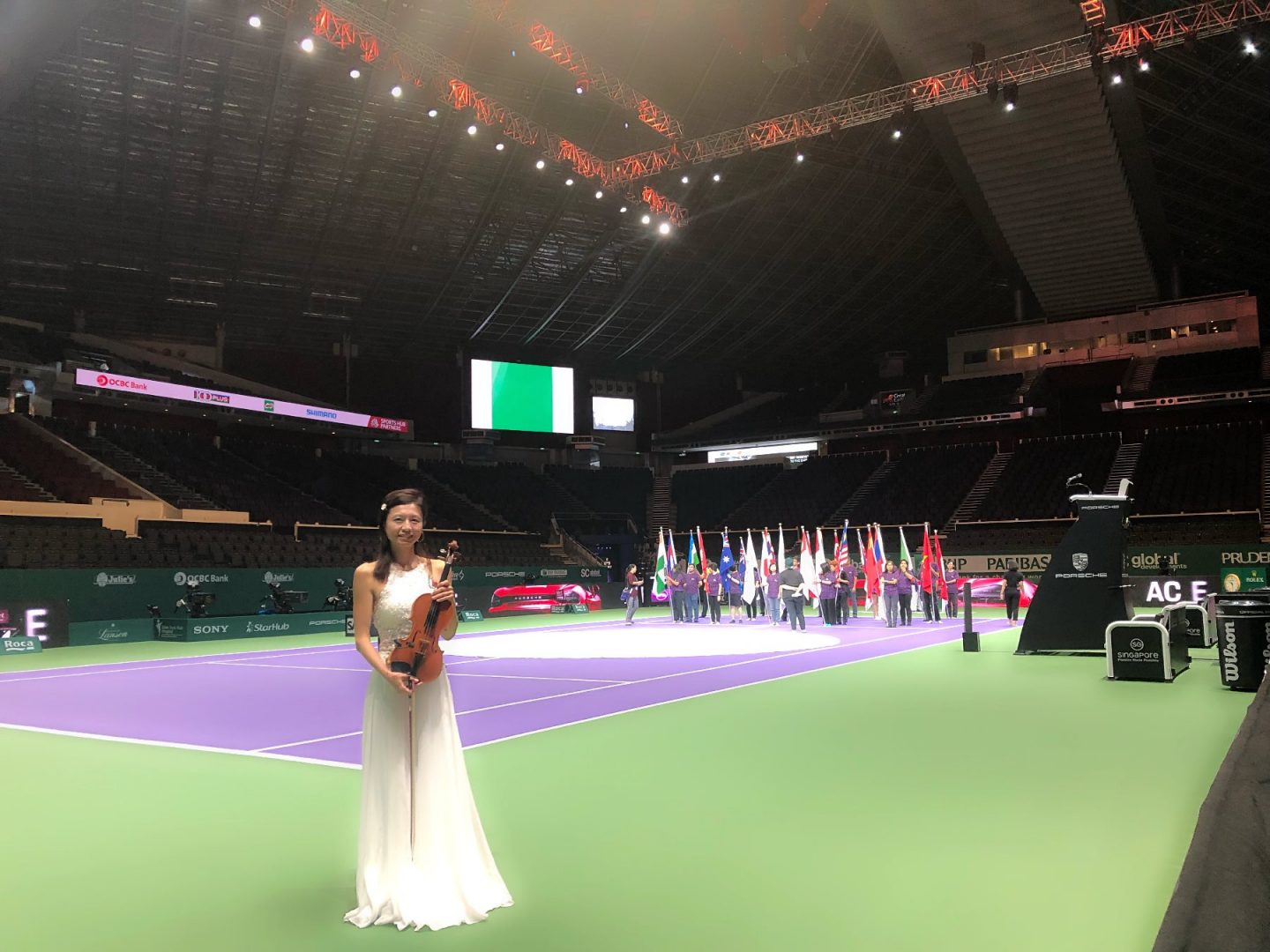
Eileen performing at the Singapore Indoor Stadium for the Opening Ceremony of WTA 2018.
“He told me to talk to whichever God I believed in and pray for strength for the training. I believed God was with me all this while, sending the Indian woman and this coach when I needed help,” said Eileen, who went on to break the National 100m Hurdles Record even at the relatively older age of 27.
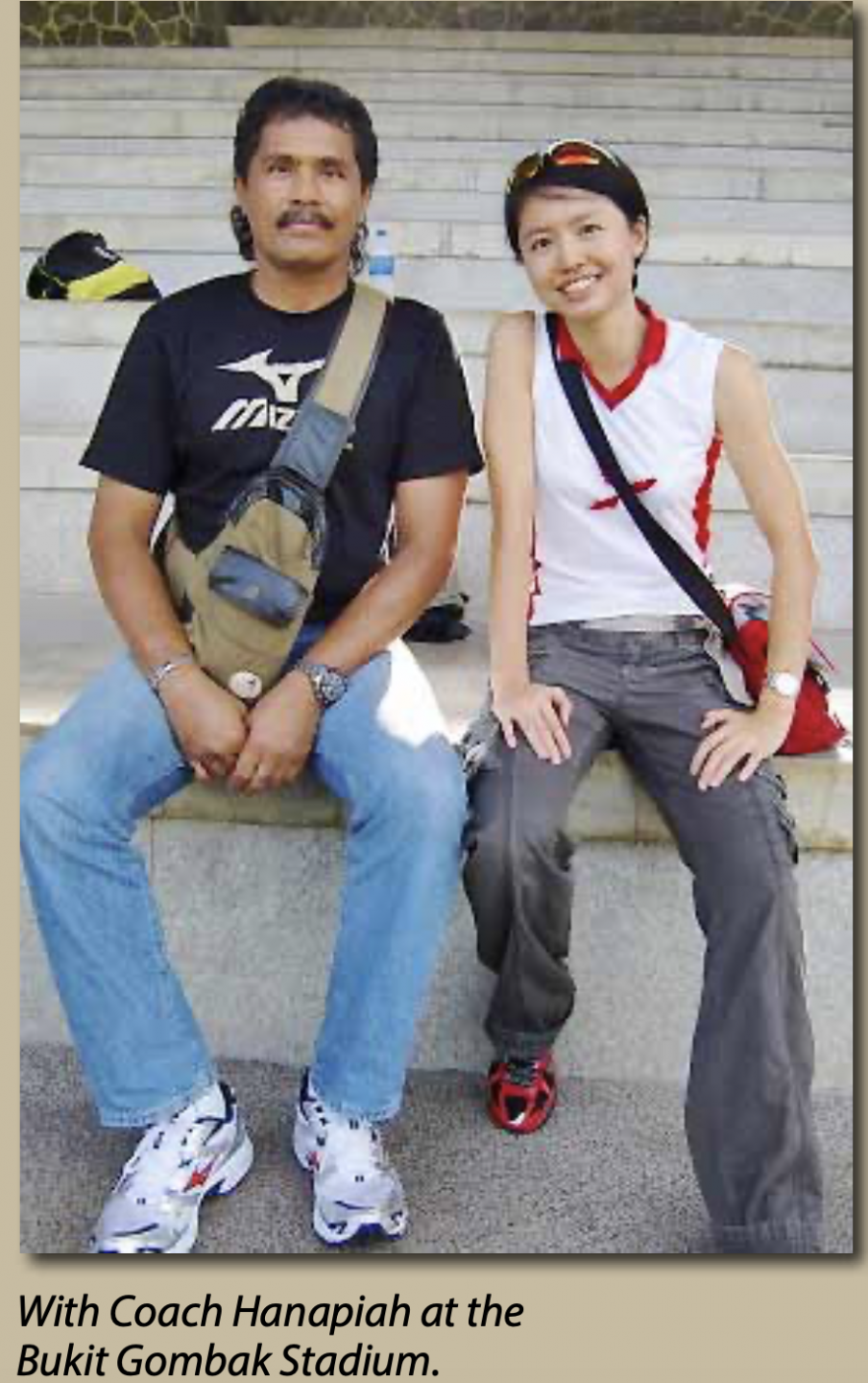
Eileen at 26, with the coach from Malaysia who encouraged her to compete again.
She later remarried but life was still no bed of roses.
She found herself easily triggered by certain remarks made by her husband or family members. During a particularly heated exchange, she slammed her hand into a sharp kitchen knife and blood splattered all over the kitchen.
After another similar episode with her orchestra mates in 2016, she stormed off and decided to end her life. Earlier, she had already planned how to end her life so she simply made her way to the place where there was a rapid flow of water in order to drown herself. Fortunately, her husband chased after her, but tore his tendon in the process.
“My behaviour didn’t make sense. I was anxious and had anger management issues though I knew many of those people around me loved me, especially my husband and my mum,” said Eileen.
Her time in China had traumatised her to the extent that she felt neglected and abandoned.
She saw Christian psychiatrist, Dr Ken Ung, who diagnosed her with two different types of mental disorders: Social performance anxiety and post-traumatic stress disorder.
It turned out that her time in China had traumatised her to the extent that she felt neglected and abandoned. She had lacked so much of the social interaction typical of a “normal” childhood that she felt crippling anxiety in the need to perform and be accepted by people.
Dr Ung did cognitive behavioural therapy with her and, upon Eileen’s request, also shared with her about God.
“I realised I was triggered by things said that brought back the fear that had been there since childhood. Fear that I would not be loved and would be alone. But Dr Ung told me that it is time I stop giving myself to others but learn how to receive love instead,” said Eileen.
During that time, a friend recommended that she join the Christian Fellowship Meeting (CFM), a marketplace meeting of Christians in the central business district.
As usual, Eileen would sit by herself in one corner of the room, hoping no one else would come and sit with her. That day, however, a woman did.
God impressed upon her just one word: Rest.
Then Pastor Pacer from Lighthouse Evangelism, who was the speaker at the meeting, urged the listeners that day to abide in God. He proposed that they place any negative matters holding them back in life on the “altar” and “burn it away”.
As Eileen prayed that day, she saw a picture in her mind’s eye. She saw her younger self, a young gymnast with curly hair, against a backdrop of fire. The arms of the child were flailing away as she was being burnt by the flames.
The woman sitting beside Eileen noticed that she was sobbing and placed her hand on her shoulder. She whispered to Eileen: “Hi, are you okay? You seem like you are burning up.” Her body was indeed getting warm.
As Eileen recounted the incident to her psychiatrist, he smiled and said: “You are recovering. This may be our last session. God is showing you how your trauma is linked to your inner child.”
Along her road to recovery, she turned to music and worship songs to understand Scripture better, and also served with CFM as a violinist in its worship team.
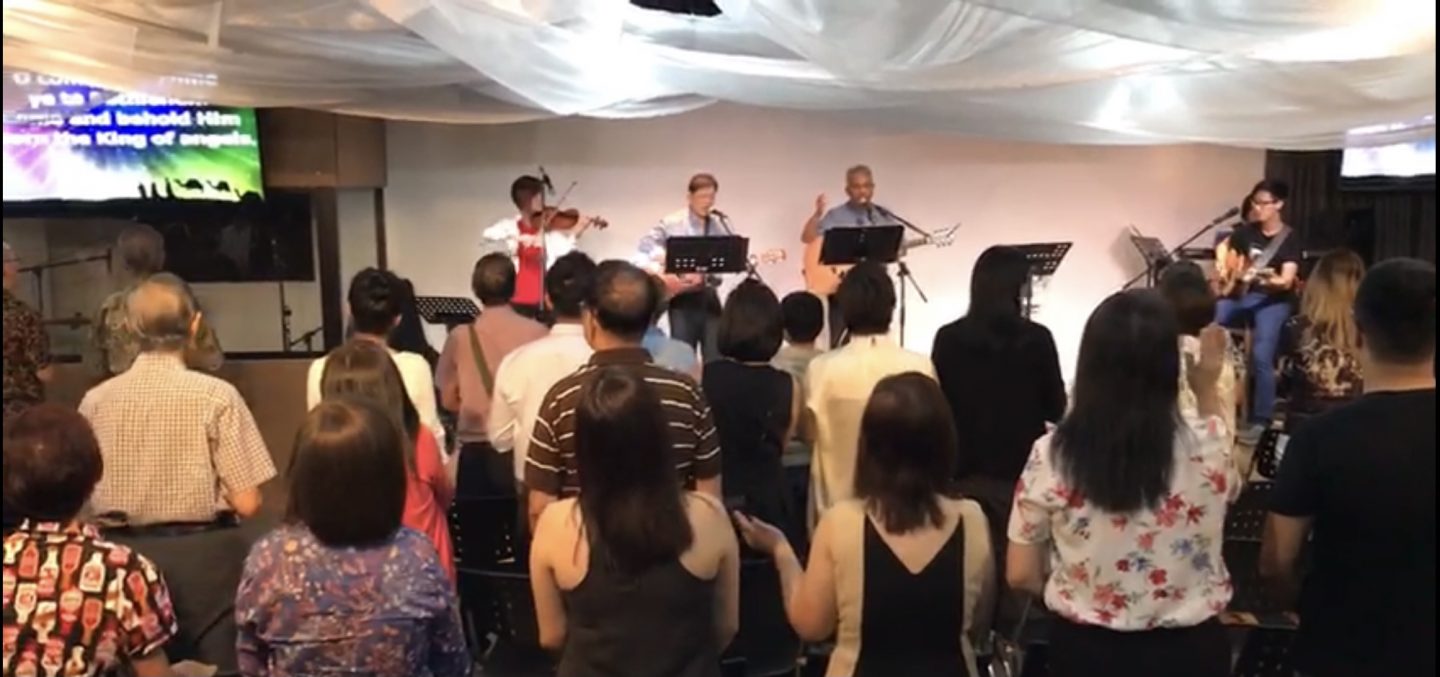
Eileen serving in the worship team of the marketplace Christian Fellowship Ministry.
She and her husband started a social enterprise called 3am Music Collective in 2019 to give hope and show empathy to people with troubled minds through the making of music.
It aims to raise awareness and reduce stigma of mental illnesses so that sufferers can get help without fear or shame.
Last year, 3am Music Collective collaborated with the National Council of Social Service to perform 10 songs about the experience of having a mental condition in its Beyond the Label Festival, which seeks to advocate for the acceptance and inclusion of persons with mental health conditions in society.
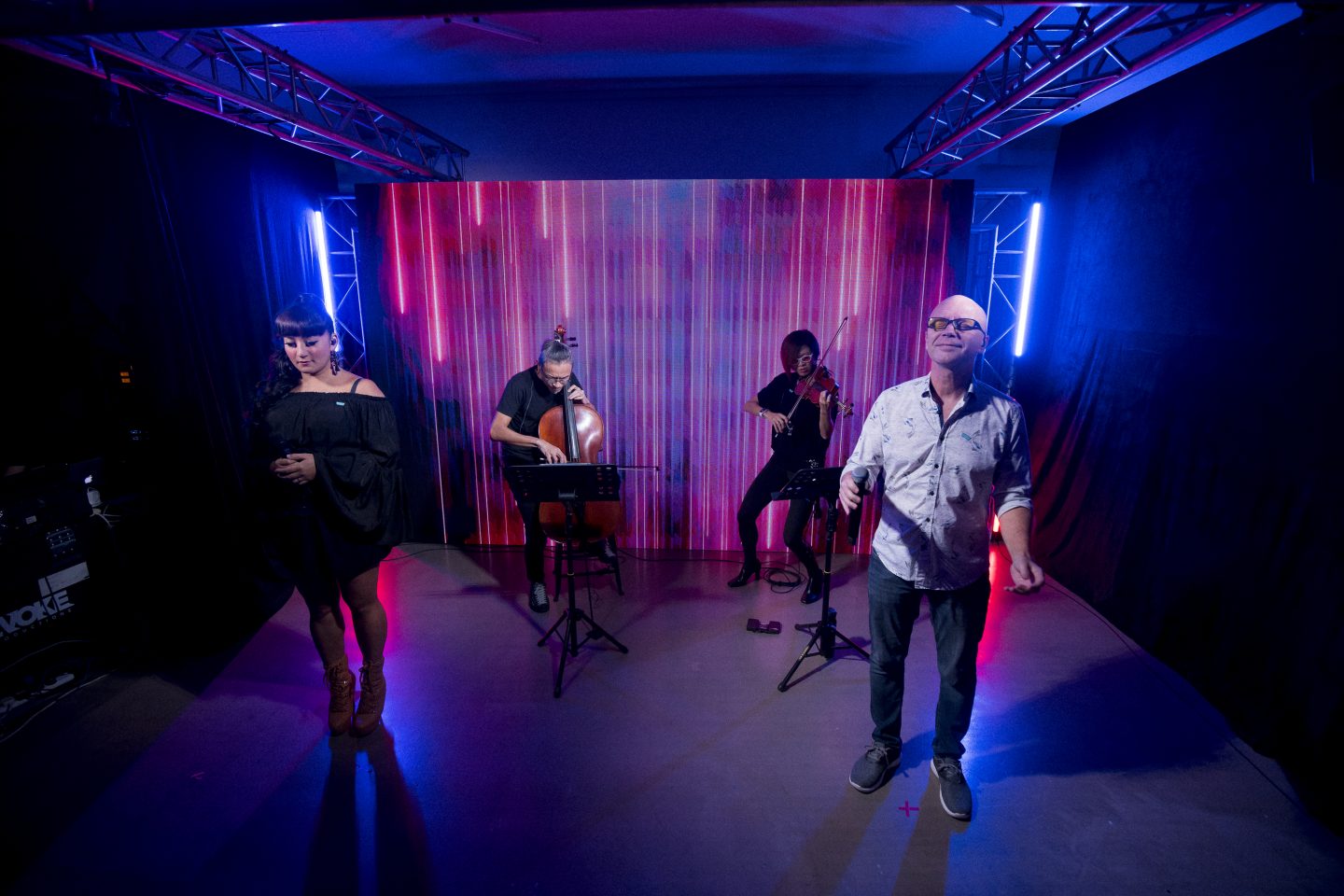
Eileen playing with other musicians from the 3am Music Collective for Beyond the Label Festival. Her husband, Ben Kranen, is in front of her.
After being slightly burnt out again from the hectic pace of work needed for the festival, Eileen woke up one morning last September and heard God impress upon her just one word: Rest.
Shortly after, a long-time track and field friend texted her and asked to meet. Usually Eileen would automatically decline invitations, as she was either too busy in the past or had crippling fears about meeting people due to her social performance anxiety.
This time, however, she wanted to heed God’s call to rest and to go out and have some fun.
Finding rest
She met her friend and was surprised that she was not anxious, and actually enjoyed herself tremendously. During that time, she also felt ministered by a song by John Wilson entitled “Dream small”.
“The children need to feel unconditional love even when things go wrong, so that they feel secure.”
The lyrics went: “Dream small/ Don’t buy the lie you’ve got to do it all/ Just let Jesus use you where you are/ One day at a time/ Live well/ Loving God and others as yourself/ Find little ways where only you can help … These simple moments change the world”.
“I realised that I do not need to do any more big or new projects. I need to take time to smell the flowers, play music for the fun of it and make time for friends,” said Eileen.
These days, she gives violin lessons to children. Unlike the past, she is more focused on making sure her students know that she loves them and has their back instead of emphasising results and competence.
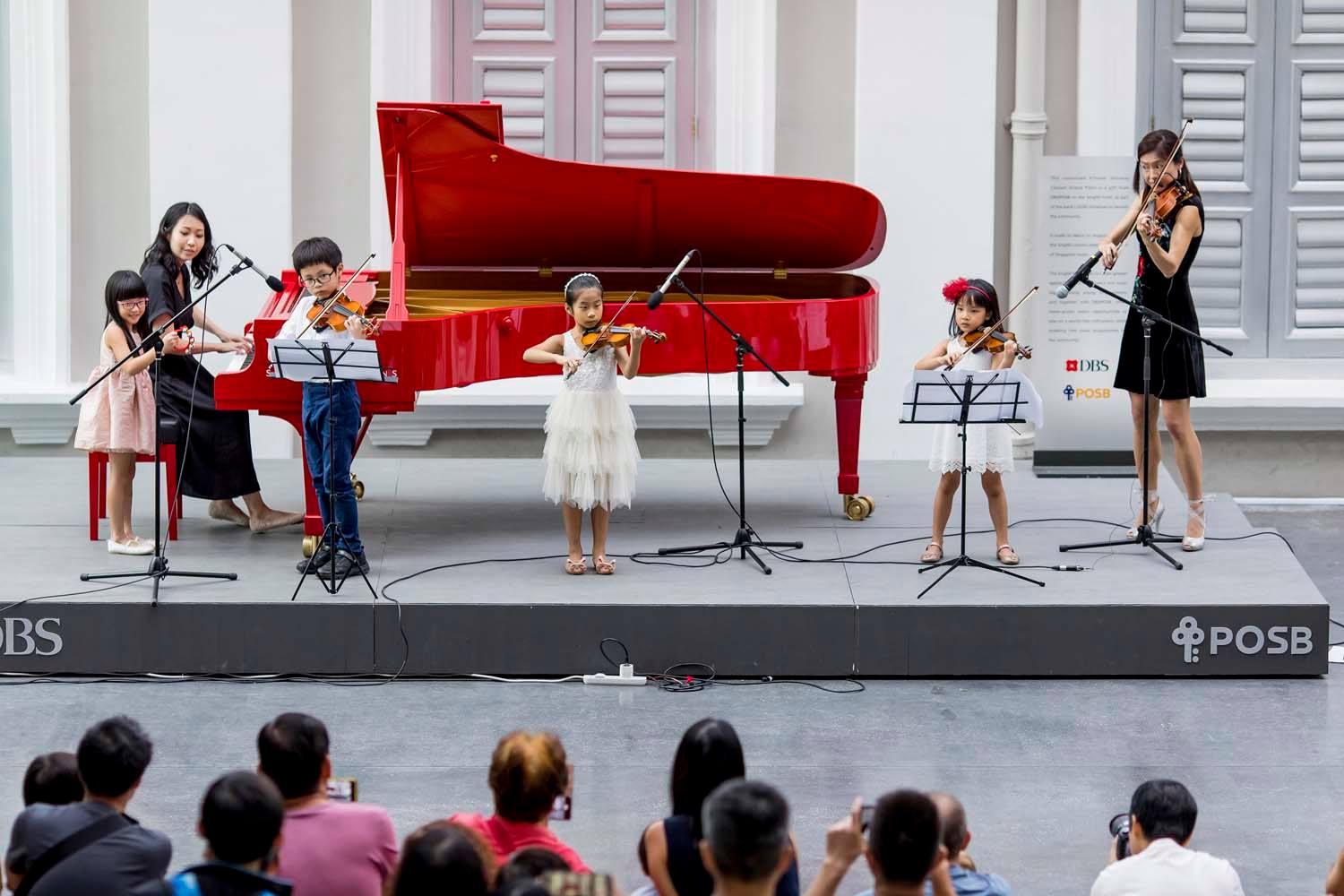
Eileen performing with her student violinists at the National Museum. Photo by Nigel Lau.
“If the child did not have time to practise a certain piece and cannot play it, it’s okay, we can do something else. I would find alternatives for them instead of scolding them,” said Eileen, who had once taught PE and music at Raffles Junior College and St Theresa’s Convent.
“My adult self is finally able to receive love from God and others.”
“Sometimes a child would be harsh on herself and stamp her feet in frustration when she makes a mistake. I would just go over and hug her. The children need to feel unconditional love even when things go wrong so that they feel secure,” she added.
In October last year, Eileen received another picture from God while praying.
It showed her young burning self again, but this time, her older self was crossing a bridge and reaching out to hug her younger self.
“I am learning to grieve the losses I had experienced as a child, so that my adult self is finally able to rest and receive love from God and others,” said Eileen, who is no longer seeing her psychiatrist.
For once in her life, she is taking a one-year break to rest and abide in God.
We are an independent, non-profit organisation that relies on the generosity of our readers, such as yourself, to continue serving the kingdom. Every dollar donated goes directly back into our editorial coverage.
Would you consider partnering with us in our kingdom work by supporting us financially, either as a one-off donation, or a recurring pledge?
Support Salt&Light